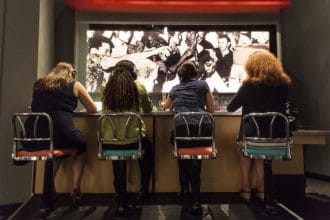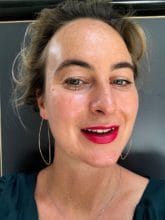My first week in Los Angeles was miserable. Months of fantasizing about a new life and a new career reality ended in a shitty campervan in a garden in the Valley, an empty mailbox, loneliness and instant self-doubt. On the fourth day I drove my rental car straight into the rear end of a sharp white Nissan on the 405-highway. The sound of metal crushing was the sound of my evaporating savings and a reminder that procrastination is not a good idea when it comes to arranging car insurance. In seven days I went from journalist on an adventure to immigrant illegally scraping a lousy job as a furniture mover for a bossy Hungarian women I deeply disliked.
It was a bad start, but it made for a good story – at least so my friends in LA kept telling me. In the end, stories were what I had come to the Mecca of podcasts, documentaries and movies for. I wanted to understand what makes Americans so good at telling stories and why they value it so much that they start teaching storytelling at kindergarten. Why every soul I meet on the road seems to be able to tell you a novel-worthy version of their lives. Why I can’t buy a pack of cereal without consuming a brand story and why commercials from American politicians can move me to tears where Dutch ones just make me feel uncomfortable.

This is where the plot twists: I didn’t find my answer in LA. I found it in Atlanta, Georgia.
The Center for Civil and Human Rights was my first stop on an afternoon with time to kill. Not far into the exhibition the museum guard escorted me to an imitation of a bar in a 50’s diner. “Take a seat,” she said. “Put your hand on the bar and close your eyes. I’ll put on your headphones.” Instantly I am sucked into history. A man asks me what I want to drink. “Coffee please.” Just after he pours me a fresh cup, a group of men come in and start shouting. ‘What you doing here nigger, you filthy piece of shit.’ They hit me. I fight back but they are with too many. My bones crack. Blood drips from my head. I fall to the floor. I am not supposed to be there. I want to get out. Get me out! Silence. The lady taps me on my shoulder and tells me it is over. I know it’s fake. But it makes me cry. And I am truly angry.

In the mood for something a little more cheerful I cross the square where a smiling face and a can of Coke welcome me to the Coca Cola Experience: a genius piece of marketing. A museum built solely on visitors making selfies with Coca Cola paraphernalia from around the globe and sharing them on social media while being high on liquid sugar. It all starts with an obligatory group tour and a short movie. For five minutes, my brain is injected with stories about friendship, family and Coca Cola. And although I know it is all a lie, and I am fully aware that I am being worked, I can’t help it: I cry. Again. Yet this time my tears have nothing to do with injustice. This time it is a carefully orchestrated artifact of capitalism that sincerely moves me.
Two slices of Americana served at the same square on the same afternoon. They couldn’t be more different yet they are both communicated through powerful stories. It made me realize that stories in America are not just an art form or a way to transfer knowledge: storytelling is a necessary survival skill in America. You need it to sell: yourself, a politician or a brand. You need it be heard. You need stories to prevent history from being repeated. There are so many fights to be fought in America, so many products to be sold. The ones that tell a good story will always win from the ones that don’t.
After that first week, things got better quickly. Work started flowing, a better neighborhood brought new friends and I never received a bill from the car crash. Yet now my adventure in LA comes to an end. Time to explore new parts of America. Time to find new stories.
Laila Frank is a freelance journalist specialized in America, campaigns and politics. She is fascinated by humanity’s (in)ability to (co)exist; her writing feeds off that fascination. She was trained as a political strategist and campaign manager and worked behind the scenes in politics for over 12 years before becoming a journalist. These months she is traveling California, looking for stories.




